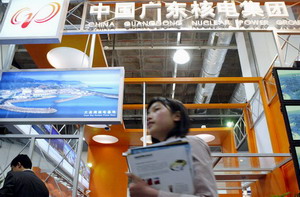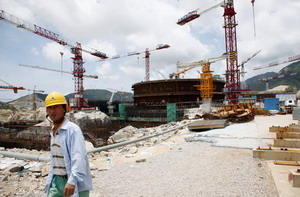Sharp decline in new-yuan lending
Updated: 2011-08-13 09:27
By Wei Tian (China Daily)
|
|||||||||||
PBOC wants to see an increase in loans to the most vunerable sectors
BEIJING - China's new-yuan lending fell sharply in July to 492.6 billion yuan ($77 billion), the lowest level for seven months, because of the nation's monetary tightening measures, but analysts said the policies will be fine-tuned in light of the current global uncertainty.
The People's Bank of China, the central bank, also said in a report on Friday that while policies would remain "prudent", there should be a targeted increase of lending in sectors such as agriculture and affordable housing.
New-yuan lending in July was 141.3 billion yuan lower than in the previous month, and 25.2 billion yuan lower than in July 2010, the central bank said in a statement on its website. Loans failed to reach the general market estimate of around 550 billion yuan.
The broad money supply (M2), which includes cash in circulation and all deposits, rose 14.7 percent year-on-year to 77.29 trillion yuan by the end of July, but the rate of increase, the lowest in six years, was 2.9 percentage points lower than the same period in 2010. The nation has set the whole-year target for M2 growth at 16 percent.
"The actual figure is normal considering the current situation, as control of inflation is still the top priority for the central government," said Zhu Baoliang, chief economist at the State Information Center, a top government think tank.
"The shrinkage of new lending was a result of the stringent monetary policies over previous months, and a seasonal decline," said Zhu, explaining that lending in the second half is normally lower than in the first, and only accounts for about 40 percent of the year's total. The China Banking Association predicted that the country's new lending this year may be between 7 trillion and 7.5 trillion yuan.
China's consumer price index reached a three-year high of 6.5 percent in July even after the country raised interest rates three times and the reserve-requirement ratio (RRR) for banks six times, with the RRR reaching a record high of 21.5 percent.
The central bank said on Friday in a monetary policy report for the second quarter that the inflation situation "still allows no optimism", meaning that the current prudent monetary stance will continue.
However, the report said that more loans will be made to the agricultural sector, small and medium-sized enterprises, subsidiary housing projects, strategic industries and environmentally friendly industry, which analysts said is a de facto "targeted loosening".
E Yongjian, a researcher with Bank of Communications Ltd, predicted that China's M2 growth could pick up in August, when new lending will be around 500 billion yuan, according to a Reuters report.
Zhao Mingqing, a senior researcher with China Construction Bank Corp, said the figures suggested that the central bank is not likely to raise interest rates or the RRR again this month.
Nomura Securities said China's monetary policy has shifted away from a tightening stance because external uncertainties now outweigh inflation concerns. The report added that the country could even cut the RRR in the worst-case scenario.
"We expect the authorities to keep the interest rate and the reserve-requirement ratio unchanged through the rest of 2011. If external conditions worsen, then we believe an RRR cut would be the first policy tool adopted," according to Nomura's report."The policy is currently in a "wait and see" mode ... and plans for countermeasures are (likely) being prepared," it said.
Related Stories
PBOC injects 70b yuan into market this week 2011-08-12 18:01
China's new yuan-denominated loans hit 492.6b yuan in July 2011-08-12 16:21
Yuan rises to record high against US dollar 2011-08-12 16:04
Faster yuan rise on cards 2011-08-12 15:19
- Draft places new curb on developers
- China sees sharp decline in new-yuan lending
- Lotte signals expansion in Chinese market
- Nation to double solar capacity
- Nokia, China Mobile open Windows
- Debt crisis threat to growing exports
- New cable network set to launch in September
- China's exports feel the hard pinch













